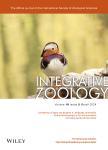An integrative insight into the synsacral canal of fossil and extant Antarctic penguins
作者机构:Faculty of BiologyUniversity of BialystokBialystokPoland Department of Clinical ScienceIntervention and Technology at Karolinska InstituteStockholmSweden Department of PalaeobiologySwedish Museum of Natural HistoryStockholmSweden
出 版 物:《Integrative Zoology》 (整合动物学(英文版))
年 卷 期:2023年第18卷第2期
页 面:237-253页
核心收录:
学科分类:07[理学] 0701[理学-数学] 070101[理学-基础数学]
基 金:Argentinean Air Force Argentinean Antarctic Institute IAA-DNA Jonas Hagström SPFS Polarforskningssekretariatet Cradle Coast NRM, NRM
主 题:Antarctica Cenozoic lumbosacral canals Sphenisciformes synsacrum
摘 要:The lumbosacral-canal system in birds most likely operates as a sense organ involved in the control of balanced walking and perching,but our knowledge of it is superfi*** constitute interesting objects for the study of this system due to their upright walking,but only the Humboldt penguin,Spheniscus humboldti,and some incomplete fossil penguin synsacra have been studied in this ***,we give an integrative comparative in-sight into the synsacral canal of extant Emperor penguin,Aptenodytes forsteri,Adelie penguin,Pygoscelis adeliae,and Eocene giant Anthropornis and/or Palaeeudyptes Antarctic penguins,using computed tomography imaging and associated data-extraction methodologies,complemented by analytical approaches ranging from geometric morphometrics to modularity,curvature,and wavelet *** document that the variability in the number of synsacro-lumbar vertebrae is evolutionarily conserved,and all studied synsacra possess osteological correlates of the lumbosacral-canal *** also found that Eocene and extant Antarctic penguins were separable on the basis of the main direction of the shape-related(size-independent)variability within said system,and *** was unique in the entire studied set in terms of the relative cranial shift of this compound ***,we suggest that the evolutionary processes,shaping both the terrestrial posture and gait,were responsible,in extant penguins,for the increased simplicity and stability of the synsacral canal cross-sectional periodic patterns,as well as pave the way for the lumbosacral-canal system modularity characterized by reduced atomization/complexity.



